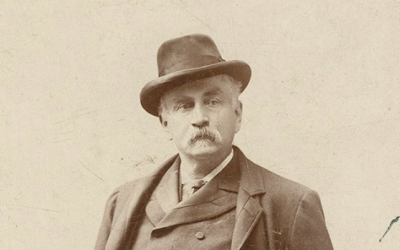Howard J. Whitmore, whose legal career in Nebraska began in the early 1880s, was in 1937 president of the Lancaster County Bar Association. On May 29 of that year his address to the association included an assessment of the role of women in the history of the legal profession prior to 1937 and their progress in the legal and political world.
Women, said Whitmore, have “greatly changed and improved law offices and the methods of doing the business. Strange to say, it is due to the inventive genius of man. When my connection with the profession began, all court and legal papers were prepared in long-hand with pen and ink. Shorthand notes were taken but must be transcribed by hand. Copies were made in the same way or by letter-press. The invention of the typewriter changed everything and opened a vast field of new and congenial employment for women. I think the first machine came to Lincoln in 1882. . . . . In December 1883 the first typewritten transcript was filed in the [Nebraska] supreme court and the district court journal began to be so written in 1890. The first will so prepared was filed in the [Lancaster] county court on September 25, 1893, and it was dated April 11, 1893.
“Women were quick to see and seize the opportunity for the new work. Schools of stenography and typewriting were started and young women hastened to avail themselves of the opportunity. They qualified themselves and soon supplanted men as law clerks. Woman is now the ornament and autocrat of most of the law offices of the country. If you wish to see the lawyer, you must make the appointment through the lady. . . .
“Women are eligible for admission to the bar, the law colleges have opened their doors to them and many have entered the profession and some have made notable success. Husband and wife have even formed copartnership in the practice but I am not prepared with information as to the harmony and success of such arrangements. As early as 1889 Mrs. A. J. Sawyer and Mrs. W. J. Bryan were admitted in this county, but they never actively engaged in the practice.” Whitmore concluded his talk with the wish that women “would lend their efforts and influence to the attainment of those many reforms in the law . . . that we men have so long advocated but have failed to accomplish.”



